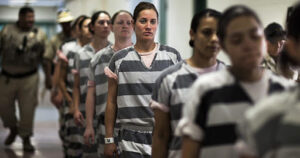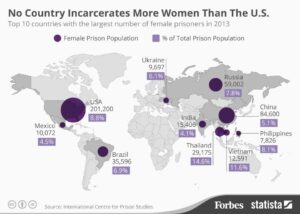
The United States prison system was originally designed to contain and punish primarily men. It’s healthcare policies and regulations were designed in response to the needs of men. However, the number of women within the criminal justice system doubled as a result of the War on Drugs, waged by the United States government in the 1970s and 1980s. Today, there are over 219,000 women inside U.S criminal justice facilities. Despite this increase in female representation, the system has not evolved to address the unique needs of women inside these facilities and the broken families left behind on the outside. Most notably, the system has failed to adequately address the healthcare needs of incarcerated women, despite the fact that many of them have an increased need for healthcare due to the compromised socioeconomic backgrounds many of them have come from. Because the healthcare services provided inside incarcerated spaces were developed with a male population in mind, women’s healthcare needs frequently go unnoticed and untreated.
Healthcare in the United States is a commodity and a privilege, despite it being a basic human right. Politicians argue that universal health coverage is simply “un-American,” despite the constitution’s vows to protect its people. The population is divided into various sects who receive healthcare from different providers; a fraction of the population is provided access to healthcare by the state due to their occupancy in state or federal institutions. The U.S. has a higher percentage of incarcerated people than any other country, and therefore the treatment offered to justice involved people should be carefully analyzed. The nation’s debate regarding healthcare policy often ignores the experiences of incarcerated people; however, we hope to shed light on the inequalities and structural issues regarding medical treatment within institutions across the country.
This site focuses on the issues of women’s healthcare in the US criminal justice system. Like many issues with this system, the problems attributed to healthcare are multi-faceted and disproportionately affect women. Specifically, through our research and work, we have found that these problems disproportionately affect women from low socioeconomic backgrounds. This is unsurprising considering the cost of healthcare in the US in general, meaning that many women enter the criminal justice system with poor health due to a lack of health insurance, or access to healthcare. Through a robust analysis of the key themes of reproductive justice, cancer, mental health and addiction, we seek to identify how the US criminal justice system causes women to suffer beyond their court-mandated punitive restrictions.
Please use the tabs on the left to explore these issues further. If you are interested in learning more or supporting causes that help improve women’s healthcare in US jails and prisons, then take a look at The Sentencing Project.
References
Solinger, Rickie. Interrupted Life: Experiences of Incarcerated Women in The United States. University of California Press, 2010.
Erica Beatson’21, Megan Deacon’21 and Jenna Triano’20 – Lafayette College
